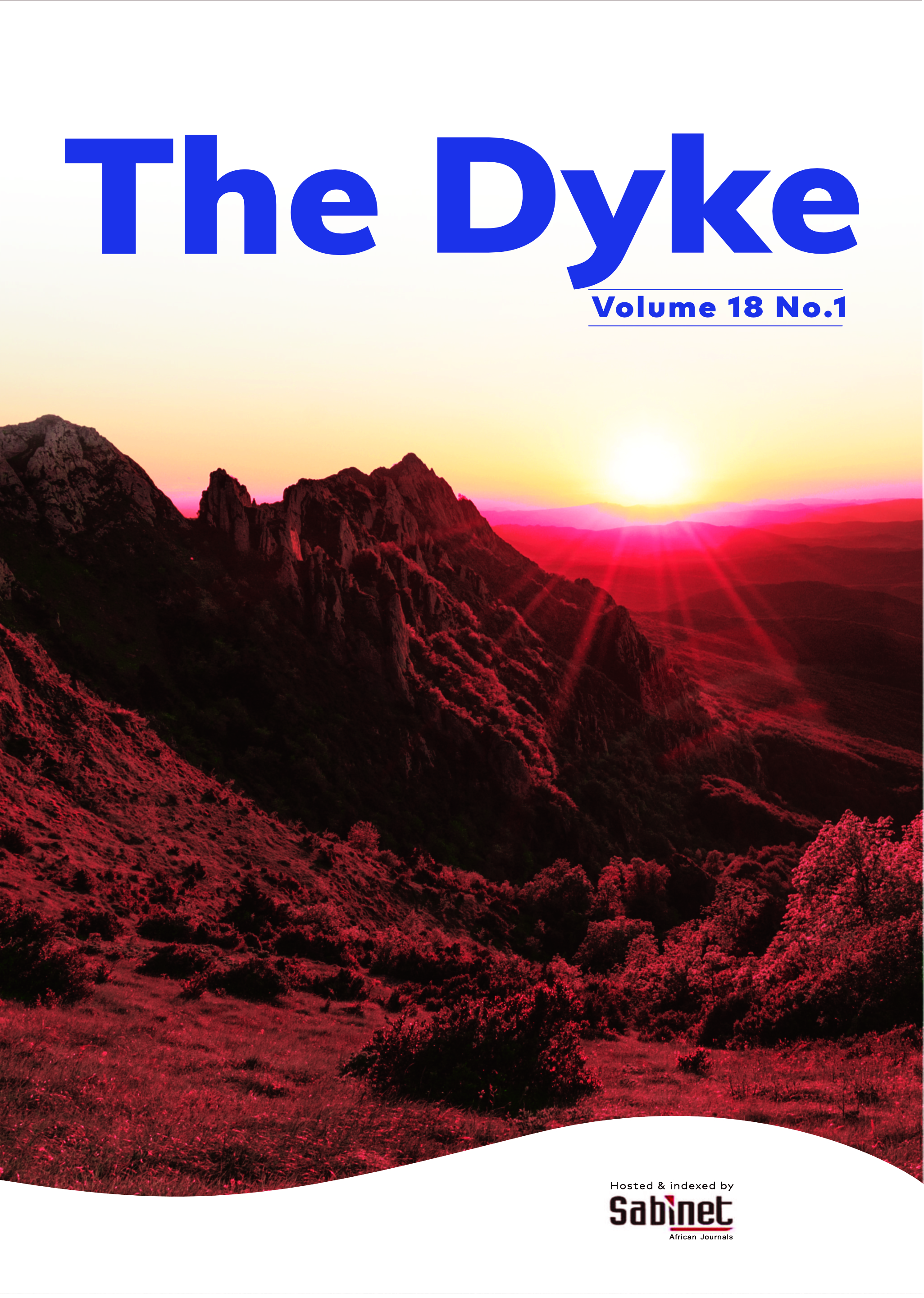Defying drought and water scarcity in rural Zimbabwe: Women’s agency in Mtelo village, Zhombe, 2000-2017
DOI:
https://doi.org/10.64754/thedyke.v18i1.310Keywords:
women, water scarcity drought, rural livelihoods patriarchy, agency survival adaptive strategies, Mtelo Zhombe KwekweAbstract
Water scarcity is a challenge for most drought-prone rural areas in Zimbabwe. It negatively impacts agricultural production and necessitates non-farm interventions to reduce food insecurity. This paper deals with a crucial topic in the field of gender studies, livelihoods, and resilience in drought-endemic areas. Women in Mtelo exercised agency to address challenges that were posed by water scarcity to their livelihoods. While they exhibited agency, the paper contends that structural factors such as patriarchy affected the effectiveness of the women’s agency. The significant body of literature and scholarship on women’s agency and resilience to water scarcity in Zimbabwe’s drought-risk districts such as Sanyati, Gokwe, Chivi, and Gwanda, to name a few, demonstrates that women often came up with creative and sustainable ways to navigate water scarcity challenges to secure their livelihoods. The paper significantly contributes to the existing literature on women’s agency by examining the various ways women defied patriarchy to secure water for household use. Using a qualitative research approach, the paper examines various forms of agency utilised by women in the Mtelo community. It shows the heterogeneity of women and the differentiated impacts of social, economic, and structural factors on women and men in Mtelo. The study finds and concludes that the livelihood problems faced by women in this rural area can be solved by their active participation in governance structures and through integrating gender sensitive approaches in strategies to improve rural livelihoods. It thus provides a refreshing argument on women’s agency and structural factors versus economic empowerment in the Mtelo rural community.
References
Agustin, L. (2006). The disappearing of a migration category: Migrants who sell sex. Taylor and Francis.
Barry, K. (1979). Female sexual slavery. Englewood Cliffs: Prentice Hall.
Bhatasara, S., & Chiweshe, M. K. (2020). Gender, climate change and women’s agency in poor communities of Zimbabwe. Climate and Development, 12(4), 273–282. https://doi.org/10.1080/17565529.2020.1768346.
Boudet, A., Petesch, P., Turk, C., & Thumala, A. (2013). On norms and agency: Conversations about gender equality with women and men in 20 countries. Washington, DC: World Bank.
Chigumira, E. (2020). Exploring sustainable livelihoods and water scarcity in rural Zimbabwe. International Journal of Water Resources Development, 36(3), 489–505. https://doi.org/10.1080/07900627.2020.1721098.
Chitiga-Mabugu, M., & Karanda, C. (2021). The impact of climate change on women’s socio-economic activities in Zimbabwe: A case of rural communities. Development Southern Africa, 38(4), 569–585. https://doi.org/10.1080/0376835X.2021.1935185.
Collins, D., Morduch, J., Rutherford, S., & Ruthven, O. (2010). Portfolios of the poor: How the world’s poor live on $2 a day. Princeton University Press.
Dzawanda, B. & Matsa, M. M. (2023). Strategies for survival in an informal economy: Illegalities of Zimbabwean informal cross-border traders at ports of entry in Southern Africa. International Journal of Community Well-Being, 6, 203–221. https://doi.org/10.1007/s42413-023-00123-9.
Jaka, H., & Shava, E. (2020). Resilience and gender in semi-arid regions: An analysis of livelihood strategies for rural women in Zimbabwe. International Journal of Climate Change Strategies and Management, 12(3), 400–416. https://doi.org/10.1108/IJCCSM-01-2020-0012.
Katz-Lavigne, S., Mkodzongi, G., & Nyandoro, M. (2023). Bandits and machete gangs: The criminalization of artisanal and small-scale mining in the Democratic Republic of Congo and Zimbabwe. Journal of Southern African Studies. https://doi.org/10.1080/03057070.2023.2124100.
Madzimure, E. (2024). Gendering water scarcity and rural livelihoods in Zimbabwe: Insights from women’s agency and livelihood diversification strategies in drought-prone Mtelo, Zhombe, Kwekwe District, 2000–2017. PhD Thesis, Great Zimbabwe University.
Manyonganise, M. (2021). Patriarchy, culture, and the agency of women: The resilience of female leadership in Zimbabwe. Journal of Gender Studies, 30(2), 209–222. https://doi.org/10.1080/09589236.2021.1874045.
Ngwenya, B., & Dube, E. (2020). Gender and water scarcity in Zimbabwe: A review of rural women’s strategies. International Journal of Water Resources Development, 36(5), 735–748. https://doi.org/10.1080/07900627.2020.1721095.
Nyandoro, M. (2007). Development and differentiation: The case of TILCOR/ARDA irrigation activities in Sanyati (Zimbabwe), 1939 to 2000. PhD thesis, University of Pretoria, 2007.
Nyandoro, M. (2018). Defying the odds, not the abuse: South African women’s agency and rotating saving schemes, 1994-2017. Journal of International Women’s Studies, Special Issue on women and feminist studies, 19(5), 177–192.
Nyandoro, M. (2019). Water and the environment in southern Africa: A Review of the literature since 1990. The Journal for Transdisciplinary Research in Southern Africa, 15(1), pp. 1–12.
Riby, K., & Zama, E. (2023). Women’s responses to resource scarcity in patriarchal societies. African Development Perspectives Journal, 14(1), 33–48.
Shumba, J. (2021). Economic impacts of water scarcity on rural women: Case studies from Zimbabwe. Journal of Development Economics, 40(4), 211–227. https://doi.org/10.1016/j.jdeveco.2021.103422.
Walsh, F. (2024). Redefining resilience in rural communities: Women, climate change, and agency in Sub-Saharan Africa. Journal of Sustainable Development in Africa, 26(2), 117–135.

Downloads
Published
How to Cite
Issue
Section
License
All articles in The Dyke are published under the Creative Commons Attribution 4.0 International License (CC BY 4.0).
Under this licence:
- Others may copy, redistribute, remix, transform, and build upon the work for any purpose, even commercially.
- Appropriate credit must be given to the original author(s) and source (The Dyke), along with a link to the license.
- Any changes made must be indicated.
Full licence details: https://creativecommons.org/licenses/by/4.0/
Archiving and Preservation
The Dyke supports long-term preservation of scholarly work through partnerships with digital repositories and indexing services, including Sabinet African Journals. Authors are also encouraged to deposit a copy of their published article in institutional or subject-specific repositories.




